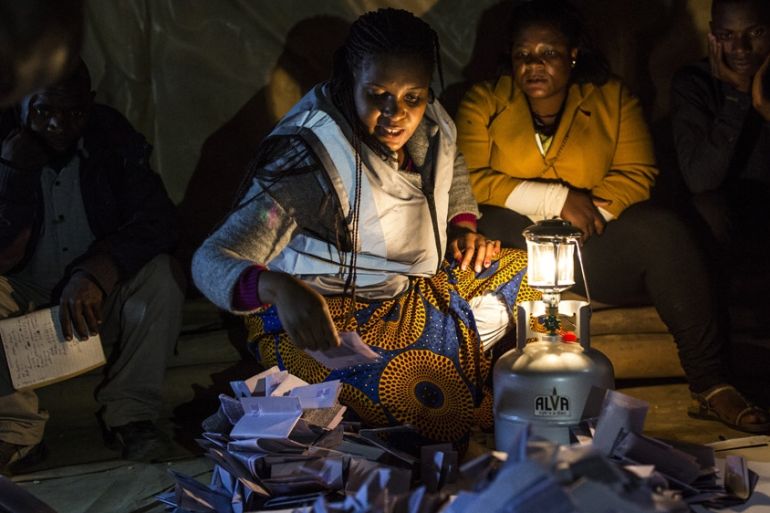Malawi votes: Polls close in tight elections
President Mutharika faces stiff challenge from his deputy Saulos Chilima and main opposition leader Lazarus Chakwera.

Malawians have voted in presidential and parliamentary elections seen as a tough test for President Peter Mutharika and his Democratic Progressive Party (DPP), following a campaign that focused on corruption and economic development.
Polls closed at 6pm (16:00 GMT) on Tuesday after a day of long queues at many voting stations.
Keep reading
list of 4 itemsJacob Zuma’s nine lives: How South Africa’s ex-president keeps coming back
A flash flood and a quiet sale highlight India’s Sikkim’s hydro problems
Ruling HDZ party wins most seats, but no majority in Croatia election
Mahara Karikude, 56, who cast his vote in Malawi‘s commercial capital Blantyre, said he voted because he wants living standards to improve.
“There is corruption, nepotism and the economy is not favourable to small business entrepreneurs. We are struggling for loans and opportunities,” he told Al Jazeera.
“The health system is also in disarray because there are acute shortages of drugs in hospitals. Education standards, too, have gone down because of the privatisation of university education. I hope that a new government can change the situation,” he said.
Mutharika, who has been in power since 2014, faces opposition from his own deputy Saulos Chilima and former Baptist preacher Lazarus Chakwera in what is expected to be a tight race.
The 78-year-old oversaw infrastructure developments and a slowdown in inflation during his first term in office, but critics have accused him of cronyism and corruption. He rejects those allegations.
“There are very long lines but I am encouraging everyone to vote because it is the people who will decide,” he said after leaving a polling station in the town of Thyolo, outside Blantyre.
Voters cast ballots for the country’s president, parliament and ward councillors. The counting is expected to take days.
Close contest
Analysts expect a tight presidential race between Mutharika, Deputy President Saulos Chilima and Lazarus Chakwera, who heads the main opposition group the Malawi Congress Party (MCP).
Chilima, 46, quit the DPP last year and formed his own party, the United Transformation Movement. He targeted young people in his campaign, pledging to create one million jobs for young people in his first year in office.
“This country deserves better,” Chilima said as he voted with his wife Mary and some aides in Lilongwe, another large city. “We’ve been at peace for 54 years and counting and we needed to see a much better economy and much happier people.”
Malawi won independence from colonial ruler Britain in 1964.
Chakwera, 64, has vowed to stamp out corruption and nepotism in the appointments of senior government officials. The MCP won a string of by-elections in 2017 and is hoping to receive an electoral boost after former president Joyce Banda joined the party, after returning from exile.
Boniface Dulani, a political scientist at the University of Malawi, said most votes were likely to be cast along regional lines, as has been the case in previous elections.
“People will still vote on Regional basis with the Southern Region voting for Peter Mutharika and Central Region voting for Chakwera. Chilima as a new entrant will get votes from the north and in the cities,” he told Al Jazeera.
The National Initiative for Civic Education, a democracy advocacy group, reported long queues at 75 percent of polling stations, though election day appeared to have gone smoothly.
Malawi Electoral Commission (MEC) chairperson Jane Ansah said she was satisfied the election process was successful, despite a few logistical problems. “Malawians turned up in large numbers to vote with some turning up one hour before the official opening of the polling centres in the morning.”
The commission said 400 students were unable to vote in Blantyre, Zomba and Mzuzu after ballot papers were not delivered to polling stations near their schools in time.
Dulani played down the issue.
“If less young people turn up to vote it will not be because of what happened in the schools because very few were really affected,” he said.
Kandani Ngwira contributed to this report from Blantyre